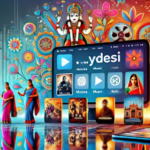Manga has taken the world by storm. Its vibrant art, compelling stories, and diverse genres captivate millions of readers globally. However, for many fans outside Japan, language barriers can hinder access to their favorite titles. This is where Olympus Scanlation comes into play—a dedicated group that translates manga from Japanese to English and beyond. By bridging these cultural gaps through translation, they open up a universe of creativity that would otherwise remain inaccessible. Join us as we explore the fascinating journey of Olympus Scanlation and its role in fostering global connections through manga!
The Rise of Manga and the Need for Translation
Manga has transformed from a niche interest into a global phenomenon. Its unique storytelling and striking visuals capture the imagination of readers everywhere.
As this art form continues to gain popularity, the demand for translations surges. Fans around the world crave access to their favorite series, eager to dive into new adventures and characters.
Translation is more than just words on a page; it’s about conveying emotion, humor, and cultural nuances. Readers want authentic experiences that resonate with their own lives while still reflecting Japanese culture.
This growing need fuels communities like Olympus Scanlation. They work tirelessly to bridge language barriers through dedicated translations. Providing timely content allows fans worldwide not only to enjoy manga but also fosters understanding and appreciation for different cultures.
The connection formed through these translations enriches both readers’ experiences and supports creators in sharing their work across borders.
The Process of Translating Manga
Translating manga is a fascinating blend of art and language. It begins with reading the original work thoroughly. Understanding the context and tone is crucial.
Next, translators must capture the nuances of dialogue. This requires not just translating words but also conveying emotions and cultural references. Humor can be particularly challenging, as it often relies on puns or idioms that don’t translate directly.
Once the text is translated, editing comes into play. Editors review translations for consistency and clarity while ensuring they align with each character’s voice.
Typesetting follows, where translated text fits seamlessly into speech bubbles without losing aesthetic appeal.
Throughout this process, collaboration among team members enhances accuracy. Each step contributes to crafting a final product that resonates with readers globally while honoring its Japanese roots.
Challenges Faced by Scanlation Groups
Scanlation groups face numerous hurdles in their quest to bring manga to international audiences. One major challenge is the language barrier. Translating nuances, slang, and cultural references without losing meaning can be tricky.
Additionally, copyright issues loom large over scanlation efforts. Many creators disapprove of unauthorized translations, which places these groups at risk of legal action. This creates a constant tension between fan passion and respect for original creators’ rights.
Resource limitations also impact scanlators significantly. Most operate on tight budgets with volunteers providing time and effort rather than financial compensation. Balancing quality with speed often results in difficult choices.
Moreover, maintaining community engagement can be demanding as well. Scanlation relies heavily on feedback from readers while adapting to ever-evolving reader preferences and trends within the manga world adds another layer of complexity to their work.
Impact on Global Readership and Cultural Exchange
Olympus Scanlation plays a pivotal role in expanding the global readership of manga. By translating popular titles, they make these stories accessible to fans worldwide. This accessibility fosters a deeper connection among readers who might otherwise remain isolated by language barriers.
Through translated works, diverse cultures intertwine. Readers engage with narratives rooted in Japanese traditions, while also sharing their own perspectives and interpretations. This exchange enriches the reading experience for everyone involved.
Moreover, scanlation encourages dialogue between cultures. Fans often discuss themes and cultural references online, leading to greater understanding and appreciation of different lifestyles.
This collaborative environment allows creators from various backgrounds to influence each other’s work as well. The ripple effect can lead to original projects that blend styles and storytelling methods from around the globe, further enhancing artistic innovation within the medium.
Interview with a Member of Olympus Scanlation
I sat down with Alex, a dedicated member of Olympus Scanlation. Their passion for manga is infectious.
“Translating isn’t just about words,” Alex explained. “It’s about capturing the essence of the story and its characters.”
They shared how each team member contributes their unique skills—from translation to typesetting. The collaborative spirit keeps everyone motivated.
“We face tight deadlines sometimes,” they admitted, “but that pressure often fuels our creativity.”
Alex emphasized the importance of cultural nuances in their work. “A joke or reference can easily be lost without context.” They strive to bring authenticity while making it relatable for readers worldwide.
The joy comes from seeing fans engage with their translations. “Knowing you made someone smile or laugh? That’s priceless,” said Alex with a bright smile.
It’s clear that Olympus Scanlation thrives on community and love for storytelling across cultures.
Future of Manga Translation and Scanlation Groups
The future of manga translation and scanlation groups looks promising yet complex. As interest in manga expands globally, the demand for quality translations will continue to rise. This creates opportunities for dedicated teams like Olympus Scanlation to thrive.
Technological advancements will play a pivotal role. AI tools can assist with initial translations, speeding up the process while still requiring human oversight for cultural nuances and emotions. These innovations could elevate the quality of translated content significantly.
However, challenges remain. Legal issues surrounding copyright and licensing may tighten restrictions on fan translations, potentially impacting grassroots communities. Collaboration with publishers might become essential to navigate these waters effectively.
Despite potential hurdles, passionate fans are likely to drive continued efforts in translating lesser-known titles that deserve recognition worldwide. The landscape is evolving rapidly, making it an exciting time for both translators and readers alike as they discover new stories together.
Conclusion
The world of manga is vibrant and diverse. As enthusiasts connect over stories that transcend language barriers, Olympus Scanlation plays a vital role in this cultural exchange. By providing translations, they not only broaden access to beloved series but also introduce readers to new perspectives and traditions.
The dedication of scanlation groups like Olympus fosters a community where fans can share their passion for manga. Each translated work serves as a bridge between cultures—offering insights into the nuances of Japanese storytelling while captivating global audiences.
As technology evolves, so does the landscape of translation. The future holds exciting possibilities for both official publishers and scanlation groups alike. With growing interest in manga worldwide, the impact of these translations will likely continue expanding.
Manga has proven itself to be more than just entertainment; it’s an avenue for connection and understanding across borders. Through their efforts, Olympus Scanlation ensures that these narratives remain accessible, enriching lives with every turn of the page.










